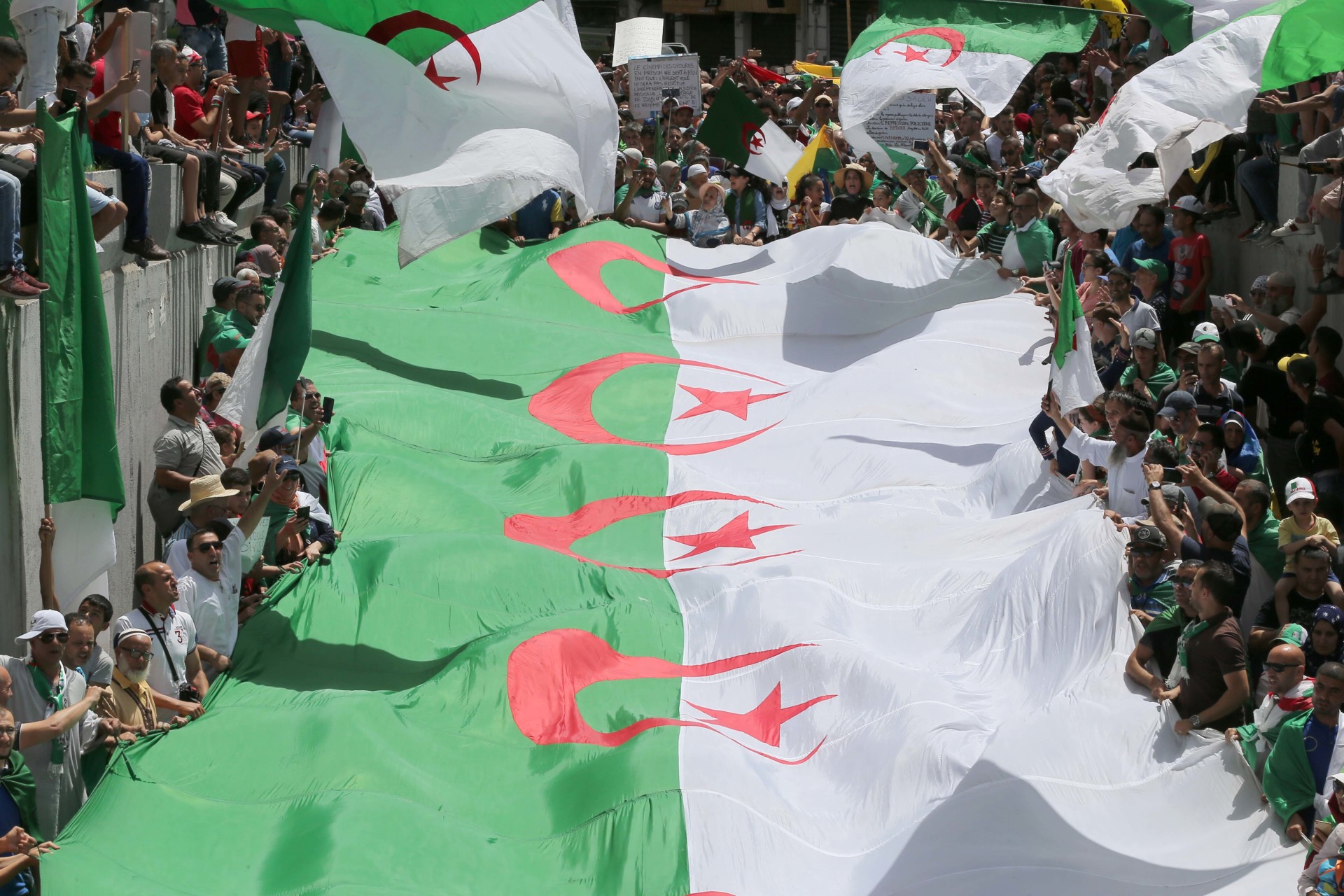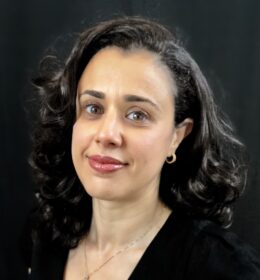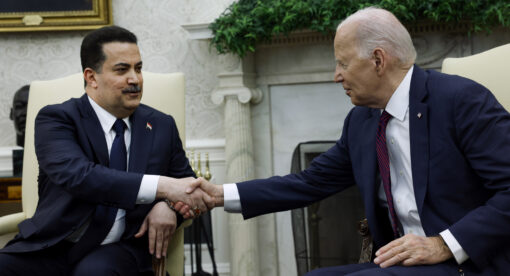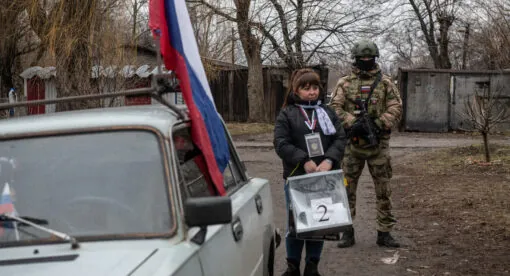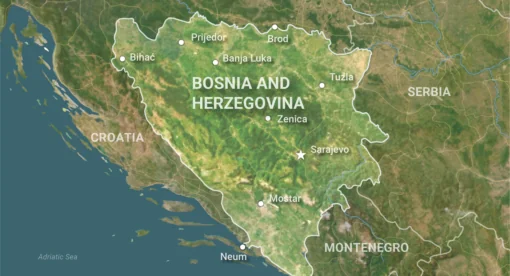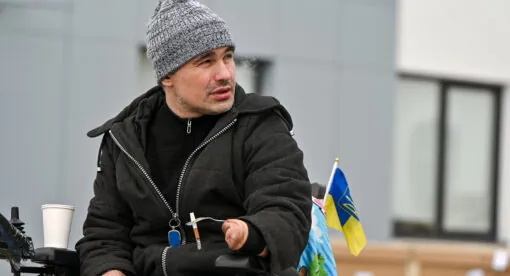The ongoing popular protests in Algeria, directed against former President Abdelaziz Bouteflika’s plans for a fifth term and by extension against “Le Pouvoir” (The Power), constitute a decisive point in the country’s political history. Indeed, it is the first time since Algeria’s independence in 1962 that nonviolent protests involving millions of people have taken place across the country.
Since the demonstrations began in February, Algerians have been pushing to make their voices heard and to be part of an inclusive decision-making process that charts their future. This restive environment is the backdrop for a decision by the Algerian Constitutional Council, a semi-independent agency responsible for the judicial review and control the voting process, to cancel the elections slated for July 4. The Council stated that the elections were impossible to organize and had no declared candidates. Its decision has created an unprecedented constitutional crisis for Algeria. It is too early to draw conclusions about the consequences of the Hirak (Movement) protests that started in February, but it is useful to review the past few years in order to grasp the origins of the current situation.
Algeria Awakens: Searching for Unity in a Fragmented Political Scene
One of the first urban movements started on Jan. 3, 2011, in the city of Tipaza, 40 miles outside Algiers. The Algerian regime minimized the significance of these Tunisia-inspired protests by referring to them as a protest of “oil and sugar” conducted by speculators. The creation of a National Coordination for Change and Democracy committee on Jan. 21, 2011, was a first step toward the questioning of the long-entrenched regime, which responded by exploiting a widely-held fear of another civil war and by injecting gas and oil revenue into the public sector to maintain control.
In 2012, more than 50 parties participated in legislative elections that some described as an “Algerian Spring,” with support from foreign entities including the European Union. In this extremely fragmented political landscape, the National Liberation Front and the National Democratic Rally — two parties strongly related to the regime — won the elections even though the abstention rate reached 57.1 percent. Yet persistent discontent among the people still threatened the regime. In response, the government funded a number of social measures including youth employment programs and social housing. However, in 2014, after oil prices fell, public authorities were forced to re-evaluate and restrict several of these measures. The resulting austerity provoked a resurgence of popular demand for social justice.
The Rise of the People: The “Silmiya” (Peaceful) Strategy
Nonviolent organizing and protests began to increase as ordinary Algerians sought to address their long-standing socioeconomic demands. The rejection of the regime’s policies was mainly expressed on social media and in the print press, as well as on satirical websites sites like El Manchar.
This crisis was accompanied by a search for a new ethical framework that could be articulated within peaceful protest practices — the “silmiya,” which became the motto of the 2019 protests. The legislative elections of 2012 triggered an amplification of demands for change. Indeed, initially introduced as an alternative to the “Arab winters” vilified by the government and state media, the 2012 elections were already a moment of tension between those who supported a boycott of the election and denounced the process as a joke and a regime determined to reinforce its legitimacy by targeting boycotters. All this happened before Bouteflika’s decline in health, which has left him unable to speak or move since April 2013. (From this perspective, the 2014 presidential election certainly marked a turning point; for the first time since 1999, the only authority figure in the ruling coalition was prevented from participating in the process — and yet somehow managed to win the election.)
Furthermore, based on the optimistic predictions of the IMF at that time, the regime’s spokesmen announced a bright economic future for Algeria, despite the first signs of a fiscal risk linked to the fall in hydrocarbon prices.
“The Revolution of Smiles”: A New Hope?
Since Feb. 22, the so-called “Revolution of Smiles” has been framed as a massive popular mobilization, representing all layers of the society. But the Hirak of Feb. 22 was first and foremost a revolution of the Algerian youth, which is not surprising in a country where 70 percent of the population is under 35.
Protests against Bouteflika’s fourth term in 2014 failed largely because people were reluctant to demonstrate against someone they once considered a leader. But those Algerians born in the 1990s did not experience the violence of the “Black Decade” civil war and grew up in a more stable economic environment. Today, this generation is in their early 30s. Avid users of social media, they have seen the rise of Algerians denouncing the endemic unemployment of the youth, widespread corruption, and contempt for the emigrants fleeing Algeria only to die in the Mediterranean. They quickly recognized the obstacles that prevent Algeria from progressing, and this awareness laid the foundation for a historic popular surge, even though the outcome remains uncertain.
Algerian solidarity now runs up against Le Pouvoir, the exogenous and corrupting governing body, in a movement embodied by the slogan “Yetnahaw gaa”(All of them will be removed).
While this revolution finds its roots in two decades of political and socio-economic struggles, the current instability focuses on the political stakes surrounding a post-Bouteflika government. In this context, economic issues become tools: The tycoons associated with Bouteflika’s inner circle were hunted down, investigated, and charged in a regime attempt to avoid open conflict with protesters. Yet the protest movement continues to grow.
It is difficult to predict the next actions of Le Pouvoir. It seems that at this stage, the only way out of this political blockage would the resignation of the entire current government and the establishment of mechanisms for dialogue with the Hirak. But this last point is problematic, because the movement lacks a central leadership to lead such efforts.
The Hirak must bring forth representatives capable of carrying out popular demands by developing a road map and negotiating change. Algeria must move forward by eventually electing a Constituent Assembly, which will draft the new Constitution and set up a transitional government. The road will be long, but a long and laborious transition is better than a sloppy and superficial one — even if the army seems to be moving toward the second option. This revolutionary moment should open the door to renegotiate civilian and military relations with a view to a genuine democratic transition. Though the army is currently a powerful institution, in a future Algeria the army will have to content itself with the role of protector of the country and withdraw from political and economic life. Unfortunately, the path to this scenario remains very difficult to imagine.
The United States must invest in this transitional process and for several reasons. First, Algeria is strategically located on the transnational jihadist superhighway running from the Maghreb through the Sahel on to West Africa. Second, Russia has close relations with the energy-rich state and we should deny access to the Kremlin, which seeks to expand its influence in North Africa. Third, Algeria can add to the pre-existing fragility in neighboring Morocco, Tunisia, Libya, and Egypt. Fourth, turmoil in North Africa has serious implications for security and stability in southern Europe. Thus, Washington must find a way to balance between the need to do business with the security establishment in Algiers while encouraging the call for a democratic transition in order to help steer the country out of its current morass.
Rim-Sarah Alouane is a researcher and a Ph.D. candidate in Comparative Law at the University Toulouse- Capitole in France. Her research focuses on constitutional law, civil liberties, human rights, and religious freedom. She Tweets at @rimsarah.
The views expressed in this article are those of the author and not an official policy or position of the Newlines Institute.

